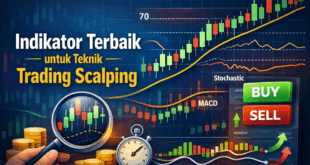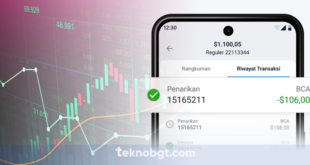Salam Sobat Teknobgt, Sapaan Pertama untuk Pembaca Setia Kami
Forex trading is gaining popularity among millennials due to its potential to earn large profits. However, it is not as easy as it seems. It requires a comprehensive understanding of market analysis and a strategic approach to minimize risks and maximize returns. In this article, we will be discussing various forex strategies for beginners that can help you make better trading decisions and achieve your financial goals.
🔍What is Forex Trading?
Forex trading, also known as foreign exchange trading, is the process of buying and selling currencies to make a profit. It is the largest and most liquid market in the world, with a daily trading volume of over $5 trillion. Forex trading can be done 24 hours a day, 5 days a week, and is accessible to anyone with an internet connection.
Why is Forex Trading Attractive to Beginners?
Forex trading is attractive to beginners due to its low entry barrier and the potential to earn significant profits. Unlike the stock market, forex trading does not require a significant amount of capital to start. Additionally, the leverage provided by forex brokers allows traders to open larger positions and increase their returns. However, leverage can also increase the risks of loss, making it important to use it wisely.
What are the Risks of Forex Trading?
Forex trading carries a high level of risk due to its highly volatile nature. Currency prices can fluctuate rapidly due to various economic and political factors, making it a risky investment. Additionally, the use of leverage can magnify losses, making it important to use risk management techniques such as stop-loss orders.
📈Forex Strategies for Beginners: Tips to Succeed
1. Develop a Trading Plan
Before you start trading, it is essential to develop a trading plan. This plan should include your goals, risk tolerance, and trading strategy. A well-defined trading plan can help you stay focused and disciplined, minimizing the risks of impulsive trades that can lead to losses.
2. Understand Fundamental Analysis
Fundamental analysis involves analyzing economic and political factors that affect currency prices. It is essential to understand the impact of events such as interest rate changes, GDP reports, and political developments on the currency markets. Fundamental analysis can help you identify long-term trends in the market and make informed trading decisions.
3. Learn Technical Analysis
Technical analysis involves analyzing charts and indicators to identify profitable trading opportunities. It is essential to understand the basics of technical analysis, such as trend lines, support and resistance levels, and moving averages. Technical analysis can help you identify short-term trends and potential entry and exit points for trades.
4. Use Stop-Loss Orders
Stop-loss orders are essential risk management tools that can help you minimize losses. A stop-loss order is an order to buy or sell a currency pair when it reaches a specified price. It is crucial to set stop-loss orders at appropriate levels to limit losses and protect your trading capital.
5. Practice with a Demo Account
Most forex brokers offer demo accounts that allow you to practice trading without risking any real money. This is an excellent way to test your trading strategies and gain experience before trading with real money.
6. Diversify your Portfolio
It is important to diversify your portfolio and avoid putting all your eggs in one basket. Diversification can reduce the risks of losses and increase the potential for profits. It is recommended to trade multiple currency pairs and use various trading strategies to increase your chances of success.
7. Keep a Trading Journal
Keeping a trading journal can help you track your progress and learn from your mistakes. It is essential to record your trades and analyze your performance to identify areas of improvement and refine your trading strategies.
📊Table of Forex Strategies for Beginners
| Strategy | Description |
|---|---|
| Fundamental Analysis | Analyzing economic and political factors that affect currency prices |
| Technical Analysis | Analyzing charts and indicators to identify trading opportunities |
| Scalping | Making multiple trades within a day to capture small profits |
| Swing Trading | Identifying short-term trends and holding positions for several days |
| Position Trading | Holding positions for long-term trends |
| Carry Trading | Buying high-yield currencies and holding them for the interest rate differential |
🤔Frequently Asked Questions (FAQ)
1. What is leverage in forex trading?
Leverage is a loan provided by forex brokers that allows traders to open larger positions than their account balance would allow. It magnifies profits and losses, making it important to use it wisely.
2. How much money do I need to start trading forex?
Forex brokers offer accounts with various minimum deposit requirements. The amount required to start trading varies depending on the broker and account type. However, it is recommended to start with a small amount and gradually increase your trading capital as you gain experience.
3. What currency pairs should I trade?
It is recommended to trade major currency pairs that offer high liquidity and low spreads. Examples include EUR/USD, USD/JPY, and GBP/USD.
4. What is a pip in forex trading?
A pip is the smallest unit of currency movement in forex trading. It represents the fourth decimal place in currency pairs. For example, if the EUR/USD price moves from 1.1000 to 1.1001, it has moved one pip.
5. How can I minimize my risks in forex trading?
You can minimize your risks by using risk management techniques such as stop-loss orders, diversifying your portfolio, and using appropriate leverage.
6. What is the best time to trade forex?
The best time to trade forex depends on the currency pairs and your trading strategy. However, it is recommended to trade during the overlap of major trading sessions, such as the London and New York sessions.
7. Can I make a living from forex trading?
Forex trading can be a profitable career, but it requires a comprehensive understanding of the market and a strategic approach. It is recommended to start with a small account and gradually increase your trading capital as you gain experience.
✅Conclusion: Take Action Now
Forex trading can be a highly rewarding activity, but it requires a disciplined and strategic approach. By implementing the forex strategies for beginners discussed in this article, you can minimize your risks and maximize your profits. Remember to stay focused, disciplined, and patient, and never stop learning. Take action now and start your journey to becoming a successful forex trader!
📝Disclaimer
The information contained in this article is for educational purposes only and does not constitute financial advice. Trading forex carries a high level of risk and may not be suitable for all investors. Always consult a financial advisor before making any investment decisions.
 TEKNO BANGET Berita Teknologi Review Laptop Komputer Gadget,Smartphone, Handphone,Gratis Download Games, Aplikasi, Software, Tutorial,Tips Trick Internet
TEKNO BANGET Berita Teknologi Review Laptop Komputer Gadget,Smartphone, Handphone,Gratis Download Games, Aplikasi, Software, Tutorial,Tips Trick Internet












